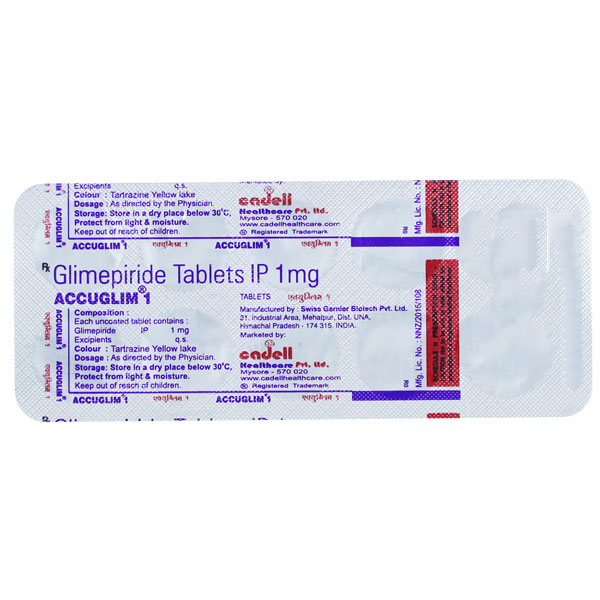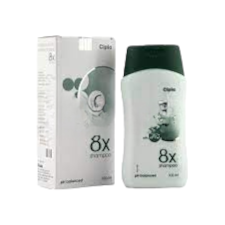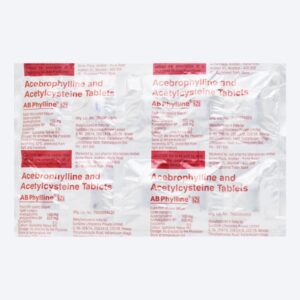Product Introduction:
Glimepiride is an oral medication that belongs to the class of drugs known as sulfonylureas. It is primarily used to treat type 2 diabetes by helping the pancreas produce insulin and increasing the body’s sensitivity to insulin. Glimepiride is typically prescribed along with diet and exercise to manage blood sugar levels in individuals with diabetes.
ACCUGLIM 1MG TABLET may be used alone or along with other medicines. It should be taken just before or with the first meal of the day. Take it regularly at the same time each day to get the maximum benefit. Your doctor will decide what dose is best for you and this may change from time to time according to your blood sugar levels.
Keep taking ACCUGLIM 1MG TABLET even if you feel well or your blood sugar levels are controlled. If you stop it without consulting your doctor, your blood sugar levels could rise to put you at risk of diabetes complications such as kidney damage, blindness, nerve problems, and loss of limbs. Remember that it is only part of a treatment program that should also include a healthy diet, regular exercise, and weight reduction as advised by your doctor. Your lifestyle plays a big part in controlling diabetes.
The most common side effects of taking ACCUGLIM 1MG TABLET include low blood sugar levels (hypoglycemia), nausea, headache, weakness, and dizziness. Make sure you recognize the signs of having low blood sugar levels, such as sweating, dizziness, headache, and shaking, and know how to deal with them. To prevent this, it is important to have regular meals and always carry a fast-acting source of glucose such as sugary food or fruit juice with you. Drinking alcohol can also increase your risk of low blood sugar levels and hence should be avoided. Some people may experience an increase in weight with this medicine.
Benefits:
- Blood Sugar Control: Glimepiride helps lower blood sugar levels by stimulating the release of insulin from the pancreas.
- Improved Insulin Sensitivity: The drug enhances the body’s response to insulin, allowing cells to better absorb and utilize glucose.
- Management of Type 2 Diabetes: Glimepiride is effective in controlling hyperglycemia in individuals with type 2 diabetes, contributing to overall diabetes management.
Side Effects:
While Glimepiride is generally well-tolerated, it may cause side effects in some individuals. Common side effects include:
- Hypoglycemia (Low Blood Sugar): This is the most common side effect. Symptoms may include sweating, shakiness, dizziness, and confusion.
- Weight Gain: Some people may experience weight gain while taking Glimepiride.
- Digestive Issues: Nausea, vomiting, and diarrhea are possible, though less common.
- Allergic Reactions: Serious allergic reactions are rare but can occur. Seek medical attention if you experience rash, itching, swelling, severe dizziness, or difficulty breathing.
Drug Interactions:
It’s important to inform your healthcare provider about all medications, supplements, and herbal products you are taking, as Glimepiride may interact with certain drugs. Some notable interactions include:
- Beta-Blockers: May mask symptoms of hypoglycemia (low blood sugar).
- NSAIDs (Nonsteroidal Anti-Inflammatory Drugs): Can enhance the blood sugar-lowering effects of Glimepiride.
- Sulfonamide Antibiotics: Some individuals with sulfa allergies may also be allergic to Glimepiride.
- Certain Diuretics (Water Pills): Can affect blood sugar levels.
It is crucial to follow your healthcare provider’s instructions, monitor blood sugar levels regularly, and report any unusual symptoms or side effects promptly. Only your healthcare provider can determine the appropriate dosage and usage of Glimepiride based on your individual health profile.
SAFETY ADVICE

Alcohol

Pregnancy

Breast feeding
Monitoring of the breastfed infant’s blood glucose is advisable during maternal therapy with Accuglim 1mg Tablet

Driving

Kidney
Use of Accuglim 1mg Tablet is not recommended in patients with severe kidney disease. These patients can experience very low blood sugar levels which may become normal after a long time.

Liver
However, the use of Accuglim 1mg Tablet is not recommended in patients with severe liver disease. These patients can experience very low blood sugar levels which may become normal after a long time.
| Weight | 0.5 kg |
|---|---|
| Dimensions | 10 × 10 × 10 cm |




